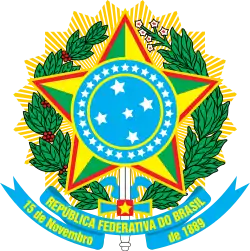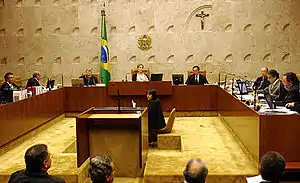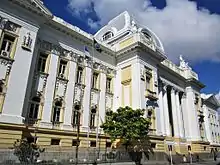Judiciary of Brazil
The Judiciary of Brazil is the group of public entities designated by the Brazilian constitution to carry out the country's judicial functions. It consists of five entities, namely: the Supreme Federal Court (STF); the Superior Court of Justice (STJ); federal regional courts; military courts; and the courts of states, the federal district, and territories. The STF and the superior courts - the Superior Labor Court (TST), the Superior Electoral Court (TSE), and the Superior Military Court (STM) - are based in Brasilia, Brazil's capital, and have jurisdiction throughout Brazil. Eleven justices (or "ministers", Portuguese: ministros) sit on the Supreme Federal Court, whose primary function is to uphold the constitution. The STJ consists of at least 33 justices.
 |
|---|
| This article is part of a series on the politics and government of Brazil |
|
|
Overview
The system is divided primarily into ordinary courts (Justiça comum) and specialized courts (Justiça especializada).
The specialized courts are federal and are divided into three areas of practice: military courts, labor courts and electoral courts.
The ordinary courts are divided between federal and state judiciaries. The judiciary of the Brazilian Federal District has the same subject-matter jurisdiction as other ordinary state-level judiciaries over its territory, but is kept and organized by the federal government.
Municipalities hold no judicial powers.
The system also includes two special central courts that are separate from the other divisions: The Supreme Federal Court and the Superior Court of Justice. Both have headquarters in Brasília.
Supreme Federal Court

The Supreme Federal Court (Supremo Tribunal Federal) is the highest body of the Brazilian Judiciary. Its main responsibility is to serve as the ultimate guardian of the Brazilian Constitution, with the roles of a constitutional court.
The most common tool of that Court is the Extraordinary Appeal (Recurso Extraordinário), granted when judgements of second instance courts violate the Constitution.
The Supreme court also holds the power to analyze the constitutionality of a federal or state law or statute, and thus of declaring it invalid, through the Direct Action of Unconstitutionality (Ação Declaratória de Inconstitucionalidade).[1]
Other original jurisdiction issues include decision about extradition.
Members are appointed by the president and are approved by the federal senate.
National Justice Council
The National Justice Council (Conselho Nacional de Justiça) functions alongside the Supreme Federal Court. Created in 2004 by the 45th Constitutional Amendment, the Council is headquartered in Brasília and has a national scope to its jurisdiction. The objective of the Council is to exercise administrative control over the Judiciary (except the Supreme Federal Court), as well as plan and coordinate joint actions between the courts. The Council also has some disciplinary powers over judges, but cannot remove them from office, which can only be performed by their own Courts or by final decision of a judicial procedure.
Superior Court of Justice
The Superior Court of Justice (Superior Tribunal de Justiça) is the highest Brazilian court for non-constitutional issues concerning both states and Federal ordinary courts. It grants a Special Appeal (Recurso especial) when a judgement rendered by a court of second instance conflicts with a federal statute disposition or when two or more second instance courts rule differently on the same federal statute. Other roles include deciding most jurisdiction conflicts and granting the exequatur to foreign judicial decisions.
Federal Regional Courts
| Portuguese Wikisource has original text related to this article:
Title IV of the Brazilian Constitution (in Portuguese) |
There are five Federal Regional Courts (Tribunal Regional Federal - TRF), each covering several Brazilian states. They are established by articles 107 and 108 of the Constitution. Together with the Federal judges (juízes federais), the Federal Regional Courts make up the Federal Courts of Brazil, which is part of the Judiciary branch.
Each Federal Regional Court has seven (or more) judges of the second instance, named by the President, and holds court around the region of their jurisdiction.[2][3]
Specialized courts
Military courts
They are the courts-martial of the Brazilian Armed Forces. At their head is the Superior Military Court (Superior Tribunal Militar). These courts integrate both civilian and military members.
Labor courts
They have jurisdiction over labor law issues, including collective. They have no jurisdiction over civil servants, except in specific cases at the municipal level and employees of nationalised companies, such as Petrobras and the Correios.
First instance courts (varas do trabalho) in major cities deal with workers' individual complaints, administrative matters concerning labor law and all issues that are not in the competence of higher courts.
The second instance courts are the Regional Labor Courts (Tribunais Regionais do Trabalho) that deal with appeals. They also have direct jurisdiction over some matters of collective labor law, including solution of conflicts between trade unions and employers and the right to strike.
The system is headed by the Superior Labor Court, which functions as the highest appeal court for matters of labor law.
Electoral courts
The Electoral court system of Brazil was created in 1932, with the intention to moralize the Brazilian electoral system. It was dissolved in 1937 then reinstated in 1945, and has been in continuous operation since.
The Constitution provides for the existence of the court system. However, its structure and roles are defined in the Brazilian Electoral Code of 1964. Its typical judicial roles include judging electoral matters, both administrative and criminal, and also matters concerning political rights (not "political crimes" or "responsibility crimes").
The peculiarity of that system resides in some extra judiciary roles. It includes organizing, executing and controlling all official political elections, and the proclamation of its result.
The system headed by the Superior Electoral Court, which controls the system, and has special responsibilities in defining rules and interpretations for the electoral procedure, and also judging appeals from Regional Courts. Its headquarters are located in Brasília.
Each state has a Regional Electoral Court, based in the capital city. It has special responsibilities over state level elections.
At the local level, there are the electoral judges and electoral councils. The electoral judges are appointed among state judges. Aside from some individual roles, they preside over the local electoral council, which include four other appointed citizens.
The electoral courts have no magistrate career of its own. All judges are designated to serve for a two-year term, and may come from a magistrate career path or from ordinary courts systems, as in the case of Regional and Superior courts.
Ordinary courts
State-level judiciary

Trial courts
Each state territory is divided into judicial districts (comarcas), which are composed of one or more municipalities. Each judicial district has at least one trial court (vara), that function as a court of first instance for most cases. In large judicial districts, with two or more trial courts, there usually are specializations of the courts of first instance in terms of the subject, such as crime and family litigation. Judgments from the trial courts can be the subject of judicial review following appeals to the Courts of Justice.
Each court of first instance has a judge and may have a substitute judge. The judge decides alone in civil cases and most of the criminal cases, except that a jury has jurisdiction over willful crimes against life (murder or attempted murder, infanticide, abortion and suicide instigation or auxiliation).
Courts of Justice
The highest court of a state judicial system is its court of second instance, the Courts of Justice. Each Brazilian State has only one Court of Justice (Tribunal de Justiça in Portuguese). They are courts of appeal, meaning they can review any decisions taken by trial courts, and have the final word on decisions of law at the state level. Some states, such as São Paulo and Minas Gerais, used to have parallel Court of Appeals (Tribunal de Alçada) with different jurisdiction. However, Article 4 of the 45th Constitutional Amendment to the Brazilian Constitution decreed their disbandment in order to simplify the second instance structure.
Second instance judgments are usually made by three judges, called desembargadores. Large courts are usually divided into civil chambers, which judge civil cases, and criminal chambers.
Other roles of Courts of Justice include the control over the constitutionality of statutes passed by municipalities and the organization of the notary and civil registration services.
Some states also have separate military courts of justice that deal with military crimes and disciplinary matters of the state military police and Military Firefighters Corps.
Federal courts
The jurisdiction of the federal court system is defined in articles 108 and 109 of the Brazilian Constitution:
- Causes where the federal government, its agencies or enterprises have an interest, with the exception of bankruptcy and industrial injury, which are in states' jurisdiction, and also respecting the specific jurisdiction of the labor and electoral courts, which prevails over federal ordinary courts jurisdiction;
- Causes involving foreign governments or recognized international public organization;
- Political crimes;
- Crimes against the labor organization, including slavery (as decided in 2006 by the STF);
- Crimes committed aboard ships or aircraft;
- Foreigners and nationality rights;
- Indigenous peoples' rights.
As in the states, there are first instance trial courts (varas federais), located in major cities, with jurisdiction divided in judicial districts (seções and subseções).
The second instance courts, Regional Federal Courts (Tribunais Regionais Federais), actually number five, and have jurisdiction over circuits of the several states.
References
- http://www.planalto.gov.br/ccivil_03/Leis/L9868.htm
- "Tribunal Regional Federal - TRF" [Federal Regional Court]. DireitoNet (in Portuguese). 31 May 2017. Retrieved 2020-01-19.
- "Qual a função dos Tribunais Regionais? JurisWay Perguntas e Respostas" [What is the function of Regional Courts? Jurisway Q&A]. www.jurisway.org.br (in Portuguese). Retrieved 2020-01-19.
External links
- Supremo Tribunal Federal
- Conselho Nacional de Justiça (in Portuguese)
- Superior Tribunal de Justiça (in Portuguese)